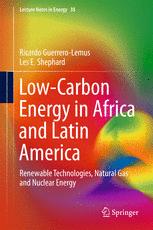

Most ebook files are in PDF format, so you can easily read them using various software such as Foxit Reader or directly on the Google Chrome browser.
Some ebook files are released by publishers in other formats such as .awz, .mobi, .epub, .fb2, etc. You may need to install specific software to read these formats on mobile/PC, such as Calibre.
Please read the tutorial at this link. https://ebooknice.com/page/post?id=faq
We offer FREE conversion to the popular formats you request; however, this may take some time. Therefore, right after payment, please email us, and we will try to provide the service as quickly as possible.
For some exceptional file formats or broken links (if any), please refrain from opening any disputes. Instead, email us first, and we will try to assist within a maximum of 6 hours.
EbookNice Team

Status:
Available0.0
0 reviewsThis book offers a comprehensive overview of energy sectors in emerging African and Latin American nations, providing a one-stop source of information and analysis of energy sectors that differ radically from those of developed countries. It focuses on how indigenous energy sources can be used within a systems framework to enhance each nation’s economic prosperity, secure their energy future and reduce global carbon emissions. It begins by examining the current energy trends in Africa and Latin America, and the constraints that current practices place on meeting future energy needs. Further chapters present a deeper analyses of each technology adapted to these regions and a description of 94 selected case examples recently published in the scientific literature (2014-2016) and covering almost all countries to highlight energy experiences that could serve as engines for developing low-carbon energy technologies across the two regions. These issues are elucidated by a large number of illustrations and tables to offer valuable insights into the topics and technologies discussed. The book enables students, researchers and professionals in energy to better understand the energy context in Africa and Latin America, and helps define strategies for supporting these regions in introducing low-carbon energy technologies that supplement indigenous sources in a manner that enhances long-term economic prosperity. It is also intended for consulting companies and government agencies involved in the energy sector, as well as environmental science and energy management students.